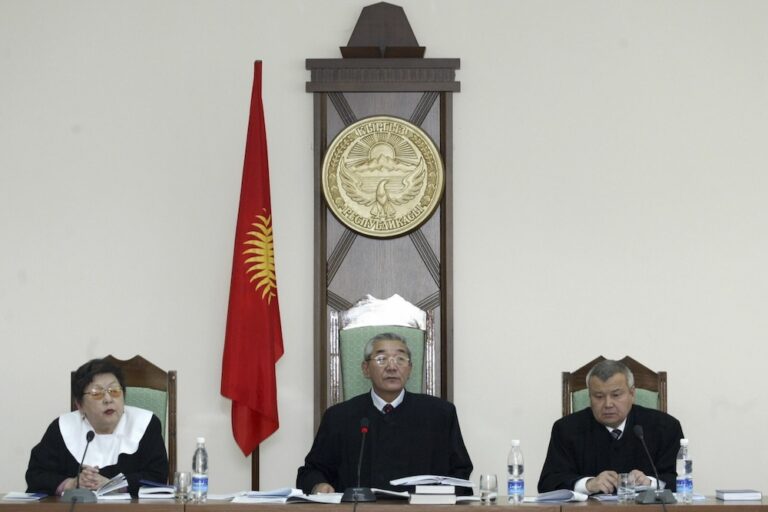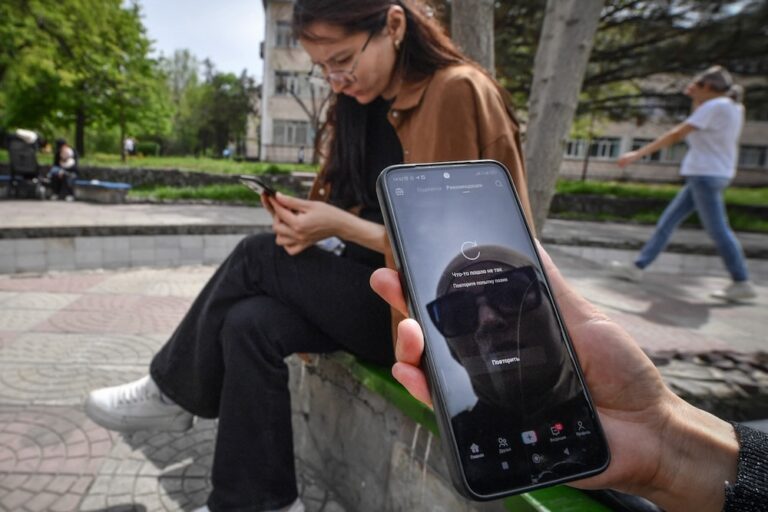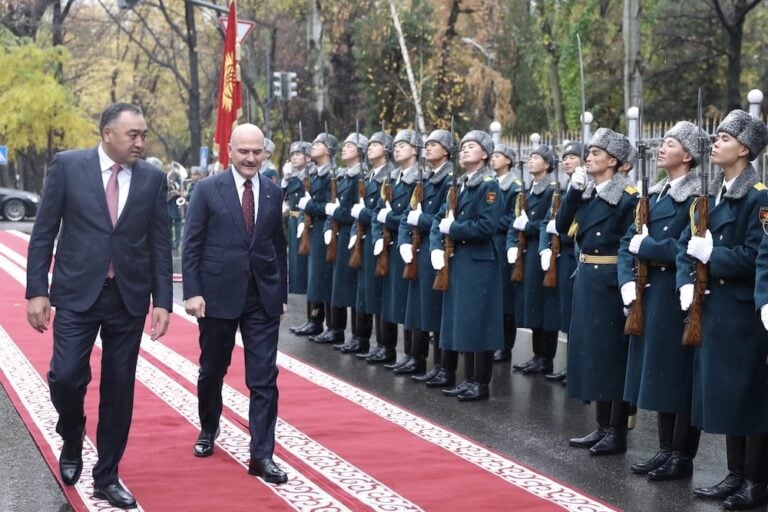CPJ urges the government to carry out an investigation into the abuse of authority by local prosecutors against three media professionals and, based on the findings, to ensure the pending prosecutions are dropped and the conviction is vacated.
(CPJ/IFEX) – New York, June 14, 2011 – In a letter to the Kyrgyz president, CPJ urges the government to carry out an investigation into the abuse of authority by local prosecutors against three media professionals and, based on the findings, to ensure the pending prosecutions are dropped and the conviction is vacated.
Roza Otunbayeva
President of Kyrgyzstan
Dom Pravitelstva
Bishkek, Kyrgyzstan
Via facsimile: +996 312 666 062
Dear President Otunbayeva,
The Committee to Protect Journalists is deeply disturbed by the ongoing prosecution of two media owners and the imprisonment of a reporter on charges of inciting and participating in violent ethnic conflict last year. The persecution of Khalil Khudaiberdiyev, Dzhavlon Mirzakhodzhayev, and Azimjon Askarov – all ethnic Uzbeks – tarnishes your stated commitments to press freedom and rule of law, and derails your government’s efforts to rebuild interethnic trust in a nation deeply divided by the June 2010 conflict.
CPJ’s review shows that regional prosecutors fabricated criminal charges against Khudaiberdiyev, Mirzakhodzhayev, and Askarov in retaliation for their journalism. Authorities also refused to investigate reports that Askarov was tortured in a regional pretrial facility.
Khudaiberdiyev, founder and owner of the regional television channel Osh TV, and Mirzakhodzhayev, owner of the independent broadcaster Mezon TV and the newspapers Itogi Nedeli and Portrfel, told CPJ they are being prosecuted for reporting on a May 2010 protest rally in the southern Jalal-Abad region. At the rally, videos of which are available online, an ethnic Uzbek leader and a governor of Jalal-Abad denounced violence and the return to power of your predecessor, Kurmanbek Bakiyev.
Prosecutors charged both media owners with separate counts of organizing and participating in mass disorder; calls for separatism; incitement to interethnic and religious hatred; abuse of office; and illegal creation of an armed group. Khudaiberdiyev and Mirzakhodzhayev, both of whom are in a forced exile, learned of the criminal case from reports in the regional press.
Khudaiberdiyev told CPJ in a detailed account that his broadcaster was taken off the air on the orders of Osh Mayor Melis Myrzakmatov. He said the mayor summoned him to the office and forced him to sell Osh TV to an ethnic Kyrgyz. In an interview with the Kyrgyz service of the U.S. government-funded Radio Free Europe/Radio Liberty, Myrzakmatov did not dispute the journalist’s claims, saying the station had aired provocative statements. Although Khudaiberdiyev was allowed to continue working for the broadcaster, intimidation by security services and continuing threats prompted him to flee Kyrgyzstan.
In a similar vein, the Osh mayor ordered the shutdown of Mezon TV; the station never resumed broadcasting. Mirzakhodzhayev, facing threats to his life, soon fled the country, causing his newspapers to cease publishing as well. In his interview with RFE/RL, Mayor Myrzakmatov did not dispute the journalist’s claims, accusing Mirzakhodzhayev of being “responsible for the deaths of hundreds of civilians.” With the two directors’ flight, Uzbek-language broadcasts have virtually disappeared in southern Kyrgyzstan.
Senior members of your administration, Mira Karybayeva and Erkinbek Mamyrov, told CPJ at a meeting in New York last month that reporting on protest rallies is not a crime in Kyrgyzstan, and that authorities have been investigating reports of detainee torture. Despite these statements, Kyrgyz prosecutors have continued to press charges against the two directors and have failed to actively pursue an investigation into the police beating of Askarov at a Jalal-Abad pretrial detention facility.
CPJ informed you of Askarov’s case last September. He was arrested for allegedly inciting ethnic violence – a charge that prosecutors later changed to complicity in a police officer’s killing and possession of ammunition – and imprisoned him for life despite a lack of evidence and numerous procedural violations during trial.
In a December interview with the independent regional news website Fergana News (formerly Ferghana), Askarov described the details of his arrest and beatings at the Jalal-Abad pretrial detention facility. He said that police forced him to recant his report of the beatings when the Ministry of Justice made preliminary inquiries last fall. Askarov also denied the criminal charges against him, including complicity in a police officer’s killing. In the most recent interview from prison with Fergana News, Askarov said that he went to the scene of the officer’s killing in his role as a reporter after being alerted by neighbors. During his trial, Askarov said, the neighbors wanted to testify on his behalf, but regional police and prosecutors threatened them into silence.
Askarov also told Fergana News that after the violence spread to his native village of Bazar-Korgon he performed a reporter’s duty: He interviewed the victims of the conflict and photographed the bodies of killed civilians and burned houses. Before he was arrested on June 15, 2010, Askarov relayed the information he had gathered to Kyrgyz human rights activists and representatives of international organizations in Bishkek, he said. Regional courts denied Askarov’s appeal, and his case is now pending in Kyrgyzstan’s Supreme Court.
Madame President, you have publicly declared your government’s commitment to press freedom and the rule of law. We call on you to stand by your words. The ongoing repression of ethnic Uzbek media representatives must cease immediately. We urge you to order the minister of justice to carry out an investigation into abuse of authority by local prosecutors and, based on the findings, to ensure the pending prosecutions are dropped and the conviction is vacated. By working toward the resumption of Uzbek-language news broadcasts you will bridge the ethnic divisions that cause tensions in Kyrgyzstan.
Thank you for your attention to this urgent matter.
Sincerely,
Joel Simon
Executive Director


